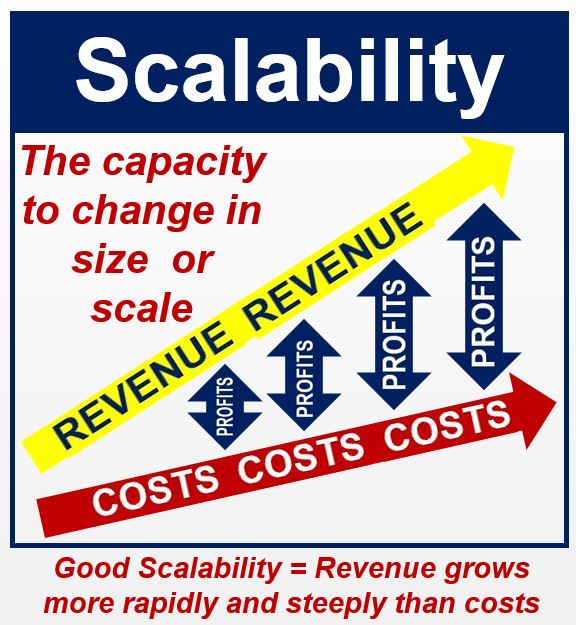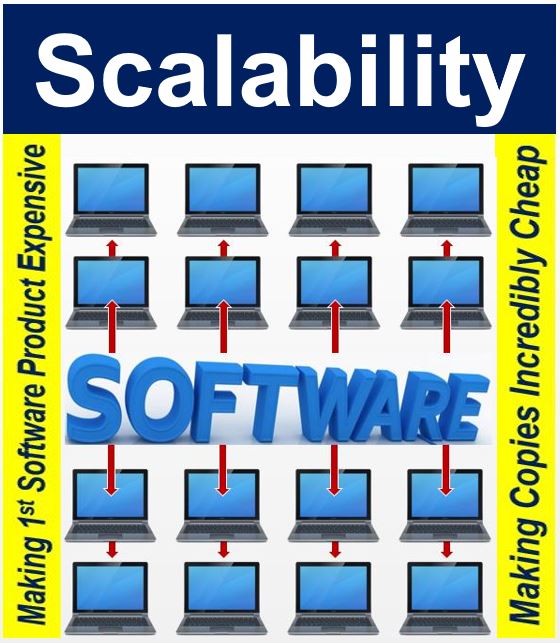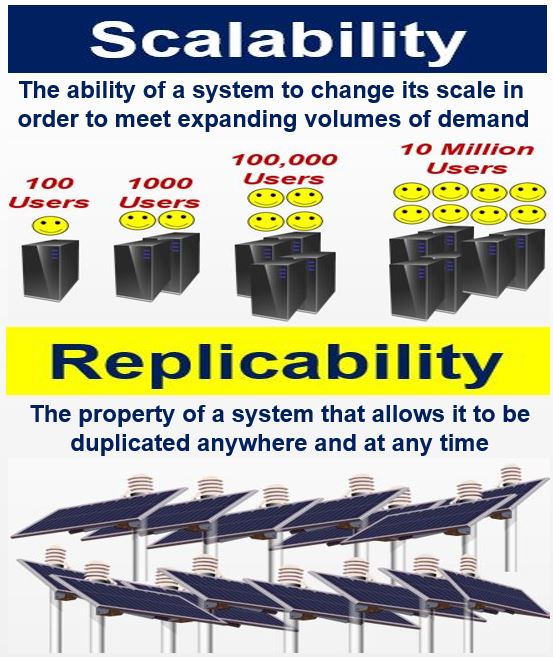What is scalability? Definition and meaning
Scalability is the ability of a system to grow to meet a company’s business needs. It is the ease with which the supply of a product, service or process can be expanded to meet changing levels of demand. In today’s high-technology marketplace, economists are increasingly talking about the importance of instant scalability.
Scalability may refer to the capability of a system to expand its total output under an increased load when resources are added.
In economics, the term usually refers to a company’s underlying business model which offers the potential for growth within the company.
Scalability may be about a plant’s ability to produce more without incurring disproportionately extra costs or a loss of functionality.

Scalability in information technology, for example, refers to scaling a system by adding extra hardware or upgrading existing hardware without having to change much of the application.
A system that ‘scales’ well is one that responds to changes in demand by immediately producing more without suffering negative consequences, such as a poorer quality product or increased equipment breakdowns.
A company with good scalability is one that is able to maintain or improve its profit margins while its volume of sales increases.
In the world of banking and finance, scalability refers to how well a financial institution handles increased demands.
BusinessDictionary.com defines scalability in two ways:
“1. Facility, plant, or unit whose size, performance, or number of users can be increased on demand without a penalty in cost or functionality.”
“2. System designed to handle proportionally very small to very large usage and service levels almost instantly, and with no significant drop in cost effectiveness, functionality, performance, or reliability. Scaleable systems employ technologies such as automatic load balancing, clustering, and parallel processing.

Scalability of a Microsoft system
With Microsoft BizTalk Server (BizTalk), an Inter-Organizational Middleware System (IOMS) that enables commercial enterprises to automate businesses processes, scalability refers to the ability of BizTalk to scale as a company’s throughput needs to increase, and if it needs to reduce latency times.
Regarding BizTalk scalability, Microsoft writes:
“After you optimize and tune various components of BizTalk, you might still encounter bottlenecks on BizTalk computers or on the MessageBox database. The types of bottlenecks that usually occur in BizTalk environments are CPU, memory, IO and lock contention bottlenecks.”
“When you start to encounter bottlenecks, you may need to either upgrade the hardware or add new hardware into the existing topology. Fortunately, BizTalk Server architecture enables you to easily scale-up and scale-out. For example, you can add multiple BizTalk Server computers into the group and also add extra MessageBox databases.”
Scalability of software and hardware
According to Techopedia, a software or business that is described as ‘scalable’ is more adaptable to the changing demands and needs of its clients or users.
Spelling: according to the English Oxford Living Dictionaries, the word ‘scalable’ has two possible spellings: 1. Scaleable. 2. Scalable.
In a Techopedia article titled – What does Scalability mean? – the author writes:
“Scalability is often a sign of stability and competitiveness, as it means the network, system, software or organization is ready to handle the influx of demand, increased productivity, trends, changing needs and even presence or introduction of new competitors.”
A basic anti-virus program, for example, can become premium and be used by companies and different entities by paying a subscription or downloading certain add-ons. It is considered scalable because you can add more resources to it.
A network is scalable in the sense that more computers and servers can be added to it in order to expand throughput or boost security.

Scalability of startups
Investors prefer to invest in startups that are scalable and ready to scale. This means that the commercial enterprise has the potential to multiply revenue with very little incremental cost.
A business is ready to scale when it has a proven product and a business model, and is about to break into new territories and markets.
The best example of a scalable solution is a software product. It costs a lot of money to create the first copy, and virtually next to nothing to produce additional copies.
Consulting companies, on the other hand, are not scalable, because their services have to be delivered by experts – you cannot produce copies of an expert in the same way copies of a software product can be made. Creating new experts is a slow and expensive process.
That is why investors do not like investing in services startups.
In a 2013 article published by Forbes magazine, Martin Zwilling, an expert who provides advice and services to entrepreneurs and startups, offers ten tips for building the most scalable startup:
– Begin with a scalable idea.
– Create a business model and plan that investors find attractive. Show that it is a scalable business, i.e. one that has the minimum of employees, low support, and high margins (>50%).
– Validate your model with an MVP (minimum viable product). An MVP is a development technique in which a new product is developed with enough features to satisfy early adopters. For a product to be ready to scale, you need to show it working with several customers who paid the full price.
– Make sure you have a strong team. If you need to be everywhere and have to make every decision, something is seriously wrong.
– Outsourcing: try to outsource whatever is non-strategic. Never outsource your core competency, and avoid relying on intellectual property that is not yours.
– Marketing: direct marketing is not scalable, especially if your product is a low-cost high-volume one. Go for indirect channels. Remember that word-of-mouth does not scale.
– The more automated your system is the better. Labor-intensive systems are not scalable.
– Embrace and attract outside funding. Reinvesting your profits – organic growth – is fine, but will not allow you to create the hockey-stick growth curve that premium buyers like. Even though some control is lost when investors join you, you will benefit from their experience and expertise, as well as the additional funding.
– Consider how to franchise or license your product, service or business. There may already be major players in your market. Finding how to make them partners is a more effective way to enhance your scalability than trying to beat them at their own game.
– Your business is continuously improving and open-ended, it is not a ‘one-trick pony’. Build a plan and strategy that shows continuous innovation.
Video – What is scalability?
In this video, Evan Carmichael explains what scalability is. He starts by talking about revenue and costs. A scalable company can grow rapidly, with revenue increasing sharply while the growth in costs is much slower.

